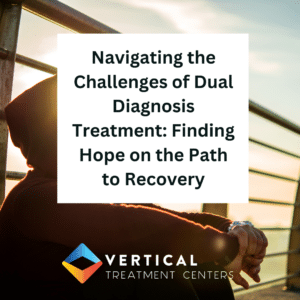
Navigating the Challenges of Dual Diagnosis Treatment: Finding Hope on the Path to Recovery
Dual diagnosis refers to the co-occurrence of a mental health disorder and substance abuse/addiction. It presents unique challenges in treatment, as both conditions need to be addressed simultaneously for successful recovery. In this blog post, we will dive into the complexities of dual diagnosis treatment, share strategies for navigating the challenges, and provide hope for individuals on the path to recovery.
Understanding Dual Diagnosis Treatment
Dual diagnosis treatment aims to address both the mental health disorder and substance use disorder concurrently. This integrated approach recognizes the interconnectedness of these conditions and emphasizes the need for a comprehensive treatment plan.
Identifying the Challenges
- Diagnostic Complexity: Diagnosing a mental health disorder in the presence of substance abuse can be challenging. The symptoms may be overlapping or masked by substance use, making accurate diagnosis a complex process.
- Treatment Resistance: Individuals with dual diagnosis often face greater treatment resistance, as the presence of a mental health disorder can hinder engagement in treatment and adherence to recovery plans.
- Reciprocal Relationship: Substance abuse and mental health disorders can exacerbate each other in a vicious cycle. Treating one condition without considering the other increases the risk of relapse and recovery setbacks.
- Stigma and Shame: Dual diagnosis can be stigmatized, leading to feelings of shame, self-blame, and isolation. These negative emotions can hinder individuals from seeking help or engaging in treatment.
Strategies for Navigating Dual Diagnosis Treatment
- Integrated Treatment: Integrated treatment involves a multidisciplinary team that addresses both substance abuse and mental health issues simultaneously. This team approach ensures coordinated care, collaboration, and effective treatment planning.
- Proper Assessment and Diagnosis: Accurate assessment and diagnosis are crucial in dual diagnosis treatment. Professionals trained in dual diagnosis should conduct a comprehensive evaluation to understand the unique needs and create an individualized treatment plan.
- Medication and Therapy Combination: Medication can play a significant role in managing mental health symptoms, particularly when combined with evidence-based therapies such as cognitive-behavioral therapy (CBT), dialectical behavior therapy (DBT), and motivational interviewing. This combination approach addresses both the chemical imbalances and the behavioral aspects of dual diagnosis.
- Supportive Environment: Creating a supportive and non-judgmental environment is essential for individuals with dual diagnosis. Peer support groups, counseling, and family involvement can provide the necessary support network to navigate the challenges and promote recovery.
- Addressing Co-occurring Disorders: Dual diagnosis treatment focuses on addressing the underlying causes of both the mental health disorder and the substance abuse. Therapy sessions can address trauma, dysfunctional coping mechanisms, and other triggers that contribute to the cycle of addiction and mental health challenges.
Celebrating Success and Embracing Hope
Recovery from dual diagnosis is possible with the right support, treatment, and commitment. Individuals should remember that progress is not linear, and setbacks may occur. Celebrating even small achievements and maintaining a positive mindset can help to remain motivated and hopeful throughout the journey to recovery.
Conclusion
Dual diagnosis treatment presents unique challenges, but with the right strategies and support, individuals can navigate the path to recovery successfully. Integrated treatment, accurate diagnosis, medication-therapy combination, and a supportive environment are key components in overcoming the challenges of dual diagnosis. By embracing hope and committing to the journey of recovery, individuals can achieve a healthier and fulfilling life.